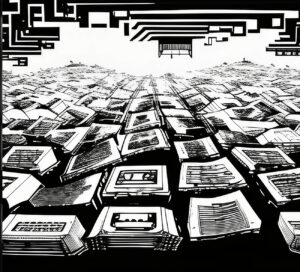FTX Contagion is Spreading
Shit really hit the fans this week! As the FTX story continues to unfurl, things are getting more berserk by the day. Suddenly, FTX was hacked! Over $600 million was sucked out of FTX’s crypto wallets just like that. If you’ve seen FTX in the news but don’t really know what’s going on, check out our previous article.
This whole disaster led many to lose their hard-earned money and, for some, their life savings. Experts believe this is a contagion, and more companies could get into trouble too. We already hear things about crypto.com, CoinShares, Wintermute… the list doesn’t end there.
In the wake of this meltdown, one saying reverberates through the Web3 space:
“Not your keys, not your coins”
What does that mean? Simply put, if you do not hold your own private keys, you do not control your funds. It then begs the question, do you really “own” your assets?
Centralized crypto exchanges like FTX are custodial wallets. Meaning users’ funds are held by the exchange, not by the users themselves. Some might ask why anyone would let a third party handle their money. Okay, think about banks. Yes, your local ones. We deposit money into it, and many of us are (apparently) unaware that they lend it to other people or businesses or whatever else they do.
A lot of us trust them, but they’re not bulletproof. Once they go down, you can kiss your $$ goodbye. You own the money, but by placing it under their care, you can lose your funds if, say, they go bankrupt or get robbed spectacularly, or if you’re living in shittier countries, you’ll just lose your money for arbitrary reasons.
Many users, especially those without much experience in Web3, choose to use custodial wallets because they’re convenient. They won’t have to deal with browser extensions, keeping their private keys safe, or remembering not to accidentally throw 8,000 bitcoins away and scrounge rubbish dumps to find their hardware. Sorry, James! With just an internet connection and a device, users can access their crypto and transact painlessly.
The downside: you sacrifice control over your assets.
FTX suspended withdrawals just before filing for bankruptcy. This left customers without access to their funds. Then, the hacking incident happened. Those funds stranded in the exchange are now wiped off the face of the earth.
With custodial wallets, users rely on third-party custodians to secure their assets. Often, these centralized platforms are the number one target of bad actors. Heck, even its own CEO can be the baddie!
Self-custody wallets let you control your funds. But the responsibility is humongous
Self-custody wallets, a.k.a. non-custodial wallets, well, yes you get a certain degree of control. In theory, you get complete control over your assets since you hold your own private keys. This mystical “certain degree of control” we’re talking about is a topic for later.
A self-custody wallet gives users full control over their private keys, and users are solely responsible for securing their own assets. Like, when you lose your keys, there’s no “forgot your password” button to help you.
There are several types of non-custodial wallets. One of the most popular is hardware, or “cold” wallets, which store private keys in a device similar to a USB drive. They are, most of the time, offline, and it only uses the internet when you want to conduct a transaction.
The more convenient type is “hot”. It’s connected to the internet and usually comes in the form of browser extensions or mobile apps. MetaMask and Trust Wallet are just some examples of hot non-custodial wallets.
In theory, self-custody crypto wallets are mostly safe as long as you keep the keys to your wallet safe and do not fall for scams. We saw in the case of FTX that non-custodial wallets are an obvious choice if you want sovereignty.
Once again, users are solely responsible for securing their own assets. There’s no central authority to appeal to if you lose your password or accidentally send some money to a scammer, etc. That’s the biggest disadvantage that deters (mostly) newcomers from keeping their assets in their own care.
You can have your cake and eat it too
A non-custodial wallet with all the perks of self-custody, minus the disadvantages, exists. And it’s called NEST®.
NEST® wallet allows you to truly own and safeguard your digital assets in a highly secure and personally-encrypted environment. All your data and assets are encrypted by you to your (and only your) device, which makes phishing scams or wallet exposures impossible. Unlike most platforms, your data, files, and keys do not sit on servers or open networks. Rather, your secured data is double-encrypted, broken down into pieces, and stored in separate locations worldwide. Only you hold the ability to decrypt it.
Speaking of sole responsibility that many of you fear, with NEST®, you won’t sweat a single drop. Lost your phone? No problem! Accounts can be easily recovered with your phone number, password, and pin on another device. You may also upload your encrypted key file to your new device to retrieve your account.
NEST® allows you to download and store your encryption key. This file can be stored however or wherever you prefer. Just remember to keep it private and safe! Never share this file with anyone else.






